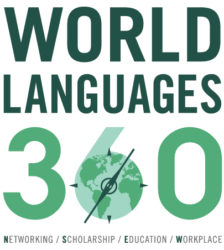FLEAT 8 (IALLT + LET) and CALICO CFPs are Posted!
World Languages 360 and Extempore 2024-2025 Grant Awards Announcement
We are thrilled to announce the recipients of our World Languages 360 – Extempore grants! Please join us in celebrating the following projects which will take place during the span of the September, 2024 to May, 2025 academic year. These grants represent multiple languages, multiple course levels, and multiple countries. Each successful proposal demonstrated a potential to impact language teaching and learning beyond the immediate learning community where they will be tried and tested. Each also represented a thoughtful and purposeful leveraging of Extempore’s capabilities. Below you will find excerpted and lightly edited portions of the successful proposals, specifically the portions that impressed us most.
Increasing World Language Proficiency Across the Communicative Modes with Extempore
Our goals for this project are as follows:
* Increased Language Proficiency: Students will demonstrate improved language skills in the interpretive, interpersonal, and presentational communication modes due to Extempore usage.
*Increased Confidence: Students will gain confidence in expressing themselves spontaneously and collaborating with others in the target language.
*Higher Engagement: Students will actively participate in language learning by completing activities and assessments and interacting with authentic content.
* Pronunciation: Students will refine their pronunciation and intonation through regular speaking practice on Extempore.
* Effective Communication: Students will learn to communicate effectively in real-world situations, bridging the gap between classroom learning and practical application.
* Cultural Competence: Students will develop cultural awareness and understanding by exposing students to the products, practices, and perspectives of the target language communities through the use of authentic resources.
* Collaborative Learning: Students will engage in peer activities, providing constructive feedback and learning from each other.
* Faculty Integration: Teachers will incorporate Extempore seamlessly into their curriculum, enhancing overall language instruction.
* Long-Term Language Retention: Students will retain language skills beyond the grant period, ensuring lasting impact, and future enrollment in upper level language classes.
Extempore as an Outlet for Language Production in Larger Classrooms: the Case of a Community College in Brazil
Educator: tasks will be developed considering the studies in Learning Experiences Design, Second Language Acquisition, and Cognitive Load theories. Multimedia feedback will be provided as needed.
Learners: individually, students will use Extempore weekly to produce spontaneous oral language in a safe, low-stress environment of their choice. Individually, it will also be used to submit versions of their written productions every two weeks approximately.
All in all, Extempore will serve the purpose of a “language lab” for students to produce language and receive personalized feedback. Oral feedback, for instance, is uncommon in Distance Education. I plan to use multimedia feedback in to create rapport and motivate students through personalization.
Using Extempore to Enhance L2 Pronunciation: An Innovative Approach to Prioritizing Intelligibility and Intercultural Awareness
Enhancing L2 pronunciation through an innovative and integrative approach prioritizing intelligibility as a fundamental objective of contemporary pronunciation instruction. This method integrates a progressive sequence of comprehensible task types, aided by Extempore, to foster clear pronunciation in L2 while promoting phonological and intercultural awareness. Extempore will play a pivotal role in assisting the teaching and learning of pronunciation strategies and skills, ultimately fostering self-regulated L2 learners and promoting intercultural sensitivity.To develop and implement this project, we will first design a lesson cycle for Argentinian university students majoring in teaching English as an L2. The project incorporates intelligibility-focused pronunciation tasks, structured progressively to build on learners’ existing skills. Using Extempore, we will create integrative tasks, teacher/peer assessments, and feedback sessions to promote clear L2 pronunciation while enhancing phonological awareness. Integrative activities will include reciprocal and non-reciprocal communication tasks, listening comprehension activities featuring diverse accent varieties, and speaking and reflective tasks, all facilitated by Extempore. Teachers will receive training on effectively using Extempore and integrating intercultural content into their lessons. A pretest will be administered to assess initial pronunciation skills and intercultural awareness, followed by a posttest after instruction to collect quantitative data. The results will be statistically analyzed using various tests to identify relationships between task performance and learning outcomes. Extempore will also be used to collect qualitative data. Continuous assessment and feedback will ensure that the tasks meet learners’ pronunciation needs and support self-regulation. Finally, we will expand the project, by providing ongoing support to teachers and learners to sustain improvements in pronunciation and intercultural sensitivity.
Increasing self-reflection and comfort with planned and unplanned L2 speaking skills with Extempore
Speaking assignments in language classes are often filled with anxiety for many students, especially spontaneous, unrehearsed performances but even presentational speaking can seem daunting. Speaking assignments with planning available before recording might become scripted, too polished, less diagnostic of students’ actual abilities in a real life situation. Both planned and unplanned speaking assignments should have a place in the curriculum though as they both help to develop positive attitudes towards speaking skills. Students will use Extempore on a regular basis in my classes to complete speaking assignments, for which they receive instructor feedback (text/audio) and also have a chance to self-reflect on specific areas such as overall completion, vocabulary, pronunciation, and grammar (DeVrind, E. et al, 2024). Students will also get a chance to re-record some of their assignments as task repetition. While initially I will provide time to review questions, eventually I would like to try the Simulated Conversation option.
*Learners will be able to reflect on the appropriateness of resources to aid different speaking tasks such as rehearsal, scripting, or immediate responses.
*Learners will explore strategies such as self-reflection, self-assessments, questionnaires, and maybe peer feedback in order to become more comfortable with unrehearsed responses to speaking prompts around course topics.
*Learners will be able to select and reflect on their preferred speaking task modalities (video, audio prompts or responses).
*Learners will attend to a variety of feedback received on submitted responses and evaluate their effectiveness.
*Learners and instructors will explore the full license features of synchronous and asynchronous groups assignments and evaluate their advantages over individual assignments (and especially how it may lead to more collaboration and interaction in our online sections).
Expanding Beyond the Classroom: Effective Communication in Spanish through ChatGPT, Extempore, and Virtual Immersion Experience (VIE)
This project will integrate effective strategies for speaking and writing, focusing on real-life applications of Spanish. The proposal includes a cultural immersion component, featuring virtual meetings with peers from diverse Latinx/Hispanic/Spanish backgrounds. This addition aims to enhance students’ socio-cultural competence and strengthen their understanding of socio-pragmatic issues in the target language. The Virtual Immersion Experience (VIE) is designed to demonstrate that transformative, lifelong learning in FL2 can begin at the elementary level. Overall, the project will underscore the value of learning Spanish as an FL2 and its relevance beyond the classroom setting.
This project also incorporates AI technology to reduce students’ anxiety and enhance their confidence in language use. ChatGPT will be used for in-class activities where students will generate conversations in Spanish, while Extempore will help assess and track students’ progress. The project will be implemented across the 2024-2025 academic year in Spanish Elementary I and II courses, and the findings will be presented in academic conferences and workshops.This project seeks to enrich the backwards design already implemented in these courses by revisiting learning outcomes to be aligned to the skills students need as global (or glocal) citizens. Consequently, students will be more engaged by improving their perception of what language learning can do for them in the world.

New Partnership with BGCPCS
World Languages 360 and Extempore Announce a New Grant Program for the Academic Year 2024-2025
Mini Grant Pilot Program Awards Announcement
We are thrilled to announce the recipients of our Mini Grant Pilot Program awards! Please join us in celebrating the following projects that are underway with the support of World Languages 360. All proposals met the program’s requirements, two of which are a clear alignment to at least one of our Compass Points and an agreement to publish, share, or present the findings in an educational publication or at a professional conference, or to share the resulting product or app. Below you will find excerpted and lightly edited portions of the successful proposals.
Integrating AI, Art, and History in Language Learning (Smith College)
This study will focus on the use of AI that can convert a text to a voice to demonstrate learners gains of the language abilities and knowledge. The AI tool the Micmonster, is a free tool and learners can access it easily. This study will present pedagogical implications and emerging themes in the future research of AI-based language learning methodology. The procedure will include giving authentic readings in Arabic to summaries. These readings will be based on a historical place, games, and other topics that have an influence in history. The student will create an art work similar to the selected reading. The main goals are to have students use the language in creative way and involve in a project as a team, and link their experience to real world situation. The students will remember this experience because they will create and plan. The teachers will learn from this experience and use it in their classes as a new approach in teaching language that involves different field of knowledge.
Expanding Horizons at MGA: Recruiting for a Strong Program (Middle Georgia State University)
We are planning a multi-faceted approach:
A. Identifying students who are doing well in our language classes and sending them an email (for online students) or a formal letter (for in-person students) letting them know how adding a language credential could benefit them and letting them know exactly how many classes they would have to take.
B. We also plan on finding key partners across campus, i.e. faculty, advisors, staff, ready to champion languages and our programs.
C. Host large recruitments events on our two main campuses (we have 5 campuses) in fall 2024 and spring 2025. We would like to have activities that can get students interested in the languages we offer:
• Activities/games focused on learning some basic words and phrases in French, Spanish, and Korean.
• Activities/games introducing students to the benefits of learning a second language for their careers and personal lives.
• Promotional material with our course offerings and degree options.
We would also work with our advising center so that a professional advisor can be present to register students for the language class they are interested in on the spot.
D. Finally, we would like to find a bilingual STEM speaker to host another event on what learning and knowing another language has done for their career.
Unleashing the Potential of ChatGPT in Curriculum Development and Lesson Planning (Foreign Service Institute, Global Language Center)
This project revolves around the role of ChatGPT 3.5 (free version) in the landscape of language education development. This project uncovers practical instances of leveraging ChatGPT 3.5 to craft comprehensive and effective lesson plans. The project explores the specific commands utilized during the research process, shedding light on the invaluable benefits derived from integrating ChatGPT 3.5 (free version) into the realms of curriculum and material development.
The project aims to illustrate insights through tangible examples across Farsi, Russian, Czech, and Slovak languages. This illustration delves into the steps undertaken to achieve results, underpinned by a discussion of the invaluable lessons gathered from this journey.
The primary objective is to share this enriching experience with a diverse audience, including educators, curriculum designers, and AI developers. The project findings not only stand to benefit ChatGPT users but also hold immense potential for language curricula and instructional practices thereby contributing significantly to the educators’ development community.
The Open Source Language Placement Project (Northeastern University)
The idea is to create an Open Source placement test for languages that is easily modifiable on a departmental level. There are many products out there that aren’t adjustable to different curriculums. Many also do not take into account dialectal variation, heritage learners, or multilingual repertoires that can often confound results. Also, instructors can often not see specific results and are left with having to do follow-up testing, which prevents the process from being transparent and efficient, when instructors already have so many other responsibilities. I want to create a meaningful type of placement that can be adapted to many languages and that works to fill in gaps that are currently present. Lastly, this placement exam should be able to communicate with university systems that oversee prerequisites (via API) to create an easy and responsible registration process.
Cross-linguistic Impact of iSpraak on Pronunciation Acquisition (Saint Louis University)
It has been noted in the literature that computer assisted pronunciation in general, and automatic speech recognition in particular, offer the most promise in enhancing learner speech (Golonka et al., 2014), and previous research we conducted (García et al., 2020) showed that iSpraak leads to specific types of pronunciation gains in second-semester Spanish students. The current research project extends previous work to new student populations by including third-semester Spanish students, and fourth-semester French students. Data collection began in January 2024 and will continue to May 2025.
Open Portal for Language Courses (Denison University)
Since costs of language books and the internet codes associated with them are so expensive, I am looking for ways to lower the economic burden for our students and, at the same time, give them a powerful tool to continue practicing Spanish outside the classroom. I am doing this to support open source books and affordable content for Spanish (and for other languages as well). My project consists of creating a website with a database with AI capabilities that provides students with assignments about different grammatical points. The artificial intelligence will give feedback and potentially grade those assignments based on specific rubrics. Moreover, this website will also contain a repository of assignments created by professors in the Department of Modern Languages with the help of AI agents. Additionally, this website will have a conversational chatbot in the target language with a text-to-speech functionality.
Come back soon for information on our next round of grant opportunities!
Mini Grant Initiative – All Grants Have Been Awarded for this Pilot Cycle as of May 23, 2024 (click for details)
Will 2023 be a Critical Juncture?

One wonders whether people living at a time of a significant turning point always realize it. Certainly, a major political upheaval or the onset of a war present themselves unmistakably, but there are other more evolutionary and gradual changes—even profound ones—that do not start off with a bang. The COVID years started off with such a bang, but we’re still in those COVID years. Colleagues with whom we were beginning to collaborate on language learning in professional and workplace settings suddenly hit the brakes with a thud and, like it or not, found themselves ramping up to teach remotely (or to support that teaching and learning).
So almost 2 years ago, we adjusted our endeavors and suspended the main thrust of our mission and, to use contemporary parlance, we pivoted. During COVID, we focused our efforts on supporting our colleagues.
But are we post-COVID teaching and learning yet? We’re still living with COVID and although in-person teaching and learning is back, learning with synchronous and asynchronous technology-enhanced options for outside of the classroom hasn’t vanished. Can we live with both? Do they need to be separated? Or is hyflex the answer? Now that we’ve all experienced some sort of technology-dependent instruction, does the future amalgamate in-person, online, and hyflex/hybrid?
What about VR and AR, which seem to be nearing the point where they are affordable and available?
How do we do these things without widening the technology gap?
If we can tackle these questions, and we begin to see movement and cohesion in research and praxis, then yes, we can say that we are living at the time of a significant turning point in world languages teaching and learning.
We are excited at these prospects and have expanded our mission and efforts accordingly. You can read more under About World Languages 360.
Meanwhile, our previous focus and enthusiasm for language learning in workplace and professional settings remains undaunted. We are thrilled to support ACTFL’s latest special interest group, the Language for Specific Purposes SIG. This represents a significant step forward in the wider profession taking up the leadership mantle in language learning outside of (in addition to) the traditional classroom space. You can read a concise description at the link below.
If you are an ACTFL member, please consider signing on to ACTFL’s new LSP SIG https://www.actfl.org/connect/special-interest-groups/new-sig-support

